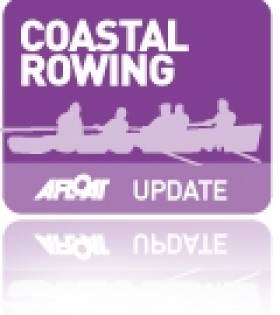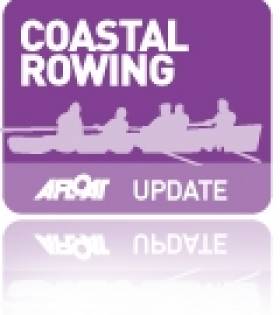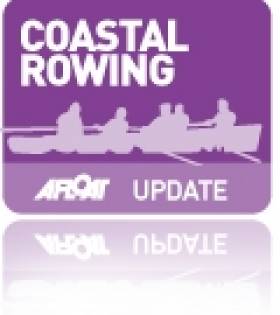Displaying items by tag: St Michaels Rowing Club
Over 100 Coastal Rowing Crews Attend 17 Races at Dun Laoghaire's St. Michael's Regatta (Results Here!)
Dun Laoghaire Harbour's St. Michael’s Rowing Club Regatta took place on Sunday, the 17th of July and brought together a large community of heritage skiff rowers from all along the east coast writes St. Michael’s Simone Sav
Coastal rowing at St Michael’s Rowing Club combines all the positive aspects of team sport, seamanship, fitness, competition and the great outdoors. The club caters for men, women and children with all levels of aspiration, from the recreational to the serious athlete.
 Traditionally held every year at Seapoint on Dublin Bay, the event drew hundreds of spectators on Sunday
Traditionally held every year at Seapoint on Dublin Bay, the event drew hundreds of spectators on Sunday
With more than 100 crews, 17 races on the cards and participation of all age categories (from youth rowers as young as 10 to ‘vets’ in their 50s and 60s), the event was the largest coastal rowing regatta in Dun Laoghaire Rathdown in 2022. Traditionally held every year at Seapoint, the event drew hundreds of spectators on Sunday. This helps keep alive the tradition of the hobblers of old. With fixed seats, wooden oars, and clinker-built boats, the sport of heritage skiff rowing differs significantly from our freshwater ‘Olympic-style’ cousins.
"Heritage rowing is a sport for all ages - from youth rowers as young as 10 to ‘vets’ in their 50s and 60s"
St. Michaels welcomed Mary Hanafin, Cathaoirleach of Dún Laoghaire-Rathdown County Council, who presented the medals to the youth rowers. In a thoughtful departure from the usual format, the club opted for eco-friendly wood medals. After all, heritage skiff rowing is truly a sport that leaves no trace, which draws on the savvy of wood craftsmanship, the power of the human body and the maritime knowledge to cross any waters.
 St. Michael’s rowing medals were in hot dema at Seapoint
St. Michael’s rowing medals were in hot dema at Seapoint
Club members were also delighted to see several elected councillors and TDs stop by or promote the event via their social media: TD Barry Ward; TD Cormac Devlin; Councilor Justin Moylan and Councillor Peter O’Brien.
 St. Michaels welcomed Mary Hanafin, Cathaoirleach of Dún Laoghaire-Rathdown County Council, who presented the medals to the youth rowersd
St. Michaels welcomed Mary Hanafin, Cathaoirleach of Dún Laoghaire-Rathdown County Council, who presented the medals to the youth rowersd
The event was supported by local businesses: Access Hearing Centre, Dun Laoghaire; Acorn Landscaping; Ardcolts Supervalu Dun Laoghaire SC; Cafe du Journal & Bearhug Clothing, Monkstown; Cinnamon, Monkstown; Elephant & Castle, Monkstown; Georges Fish Shop, Monkstown; McKenna’s Bar; Specialist Orthodontic Practice, Glenageary; The Graduate Pub, Killiney.
The St. Michael’s Rowing Club committee, and in particular Captains Nicola Fitzgerald and Gareth Whittington, would like to thank all sponsors, supporters, club members and friends for their contribution to making the event a great success.
St. Michael’s Rowing Club was founded in Dun Laoghaire Harbour in the early 1920s. Today the club consists of over 100 members, from all walks of life, with all abilities catered for, from complete beginners to experienced rowers.
Crews train Monday to Friday from March to September, from 6 pm to sundown, in traditional wooden skiffs, as well as Celtic Longboat, with an offshore boat to be added to the fleet during the 2022 season.
St. Michael’s Home Regatta results - 17th July 2022
Intermediate Ladies
1st - Fingal
2nd - Stella Maris
3rd - Dalkey
Junior Ladies
1st - Dalkey
2nd - St Patrick’s
3rd - Stella Maris
Junior Men
1st - St Patrick’s
2nd - St Michaels
3rd - Stella Maris
Mixed crew
1st - Dalkey
2nd - St Michaels
3rd - Stella Maris
Senior Men
1st - St Patrick’s
2nd - Wicklow
3rd - St Michaels
U12 boys
1st - Wicklow
2nd - St Patrick’s
3rd - Wicklow
U12 girls
1st - St Patrick’s
2nd - St Patrick’s
3rd - St Michaels
U14 boys
1st - St Patrick’s
2nd - Wicklow
3rd - Stella Maris
U14 girls
1st - Stella Maris A
2nd - Stella Maris B
3rd - Greystones
Novice Men
1st - Fingal
2nd - Bray
3rd - Dalkey
U21s Mens race
1st - St Michaels
Senior Ladies
1st - St Michaels
2nd - Wicklow
3rd - Fingal
Intermediate Men
1st - Wicklow
2nd - Stella Maris
3rd - Greystones
U16 girls
1st - Stella Maris A
2nd - Stella Maris B
3rd - Wicklow
U16 boys
1st - Bray
2nd - St Patrick’s
3rd - Skerries
U18 girls
1st - Skerries
2nd - Greystones
3rd - Bray?
U18 boys
1st - Wicklow
2nd - St Michaels A
3rd - Skerries
Vets
1st - Dalkey & Bray
2nd - Dalkey
3rd - Fingal
Dun Laoghaire Harbour's St. Michael's Rowing Club Row Round the World in 80 Day Virtual Challenge
As we emerge from what we hope will be the country's last lockdown, St. Michael's Rowing Club based a Dun Laoghaire Harbour, is nearing completion of its longest race yet. Inspired by Jules Verne's Phileas Fogg, over the last 80 days, members and friends of the club were invited to participate in a Round the World in 80 Days challenge, virtually of course, and log their progress online writes the club's Claire Sheehan
Healthy competitiveness ensued, with times and distances uploaded, from various disciplines- kayaking, cycling, running, walking, swimming, indoor and outdoor rowing, and even surfing, an unusual sight on the east coast! All while observing Covid restrictions.
 Social distancing, 40-foot style
Social distancing, 40-foot style
Sixty-three members and friends of the club participated, clocking up a total of 33,703.7 KM and providing much-needed distraction- as these pictures demonstrate, we have a tremendous amenity on our doorstep.
 Sonja Storm swimming in Killiney
Sonja Storm swimming in Killiney
As we near the end of our journey this week, Seattle-based member Jon Phillips is speeding towards virtual victory, with locals Brendan White and David Cullen coming in for silver and bronze.
 Club member Rob Collins, kayaking at dusk in Dun Laoghaire harbour
Club member Rob Collins, kayaking at dusk in Dun Laoghaire harbour
After all that excitement, attention can at last turn to getting our youth section back in a skiff and on the water for real, and hopefully our grown-ups shortly after. It's been a long winter.
 Paddleboarders doing their bit
Paddleboarders doing their bit
Coastal Rowing Championships Comes to Dun Laoghaire
#coastalrowing – St. Michael's rowing club, Dun Laoghaire, will host round six of the East Coast, Coastal Rowing Championships on Sunday 27th July, 2014. The regatta will take place from the West Pier to the North of Seapoint Tower. With more than 80 teams competing from all over the East Coast, this will be an action packed day.
There will be 14 races of all age groups with the first race beginning at 10.30am. This year's event will see hundreds of men, women and children compete over a gruelling circuit in a bid to be crowned 2014 champions in their respective field.
Viewing is best from the beach at Salthill DART station and will be an excellent opportunity to view, support and enjoy this traditional form of coastal rowing.
Malahide Yacht Answers the Call to Support St. Michael's 'Celtic Challenge' Rowing Quest
#celticchallenge – Over the coming May bank holiday weekend (2th-5th May), 12 men and women from of St Michael's Rowing Club, Dun Laoghaire and volunteers from Irish Charity GOAL, will take part in a biennial rowing race across the Irish Sea known as 'the Celtic Challenge' writes Gareth Whittington. The race sets off from Arklow, Co. Wicklow with the finishing line in Aberystwyth, Wales. At 150km, this relay race is billed as the longest 'true' rowing race in the world and draws together 27 teams from Wales, Ireland and beyond. The team is taking on this challenge to raise funds for a support project in the Philippines and a new skiff for St. Michael's Rowing Club.
Towards the end of last week, our challenge ambitions hung in the balance. 2 support boats that came forward to help us out, both had to pull out due to technical problems. However, following a PR campaign through Afloat.ie and other media channels, fellow Celtic Challenger, Robert Finglas put us in touch with Noel Rouroc who sails his stunning 48' yacht, Emiliya, out of Malahide. The news was good. After a nail biting 24 hours and a serious lack of sleep, Noel confirmed that he would be able to help us out.
On behalf of St. Michael's Rowing Club, Dun Laoghaire and GOAL, I would like to take this opportunity to thank everybody for their help. Later this week we'll be posting a live tracking link on our Facebook page, this will enable you to see an update every 15 minutes, of our epic journey across the Irish Sea. Now the real hard work begins....
Coastal Rowing Gets a Super Sunday for Dun Laoghaire Regatta
#coastalrowing – Last Sunday saw the 8th and penultimate leg of the 2013 East Coast Rowing series. It was a fantastic day in Dun Laoghaire, and the heavy downpours, which at one stage saw 8mm of rain fall within 30 minutes, was not going to dampen the spirits of the spectators and the travelling clubs from up and down the East Coast.
There were 80 teams from 9 participating clubs, competing across the 12 categories on the day. This we believe is a possible record for our sport. What can be claimed as a record is the number of St. Michael's crews that were entered; 14 in all with crews from U16s to Senior Mens & Ladies.
There were plenty of activities going on within Dun Laoghaire on Sunday, including the Rainbow Run and a swimming event from Seapoint, which added to the excitement on the day. Excellent organisation by all parties ensured a smooth running of all events.
St. Michael's had an excellent day with the 2 main success stories being the Senior Ladies crew of Eloise O'Riordan, Suzy O'Keefe, Orla Stavely, Dee Friel, (Coxed by James Byrne) coming home with yet another Gold, making them the East Coast champions with 1 race to spare.
The second success story of the day was the performance of the Inter Men's crew of Colm Crilly, Ger Ryan, Dave Cullen, Alan Quigley (Coxed by Rob Moloney), who brought home the first home Gold for a St. Michael's men's team for decades.
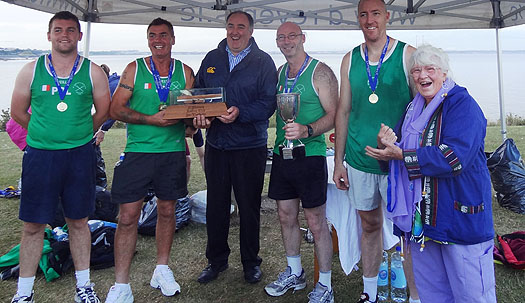
St. Pats Win Senior Trophy with Sponsor Arthur McKenna & Councillor Jane Dillon-Byrne
There were other super performances from the Junior Ladies crew taking silver behind a very strong Stella crew, a hard fought bronze for one of our Novice crews and strong performances from our 3 junior crews; U16 mixed, U18 Girls, U18 Boys.
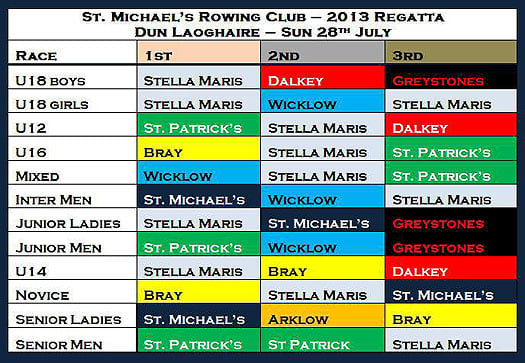
The results from last weekend have pushed us up into 4th on the overall team standings, which is way above our expectations.
The final regatta will take place this bank holiday Monday in Wicklow. The season finale starts with a parade through the town with racing due to start from 2pm.



























